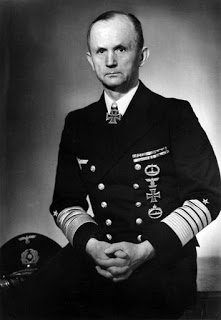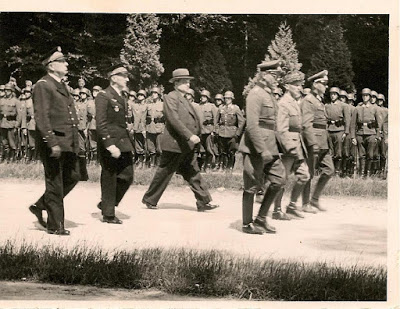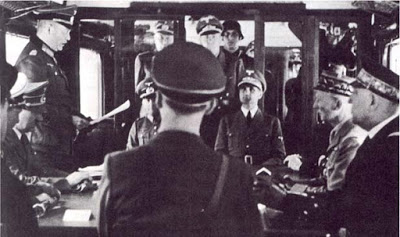This demand confirms Grand Admiral Doenitz in his tactic toward the West, which is still based on Roosevelt’s insane demand for unconditional surrender. A total surrender would have handed over millions of German soldiers in the east to the Red Army. The new head of state therefore wants to postpone surrender in the east for as long as possible, so as to draw back the eastern front to the known line of demarcation of the territory occupied by the Anglo-Saxons, and to keep the path to the west open for the greatest possible number of refugees. For the same purpose he also ordered transports over the sea to be rushed by all means.
The history of the last 20 years [1945-1965] has convincingly demonstrated which one, Eisenhower or Doenitz, judged the world political situation of that time more correctly. In his memoirs (Zehn Jahre und Zwanzig Tage, 1958) on page 461 the Grand Admiral reviews his assessment of the situation at that time: Eisenhower’s last operative measures had shown that he was unable to grasp the change in world politics that was now complete. After the crossing of the Rhine by American troops the strategic goal of defeating Germany had been achieved. “It would have been politically right for the leadership of the American army to advance to the east as rapidly as possible, so as to capture Berlin before the Russians. Eisenhower did not act thus…. The American attitude at the end of the war appeared to me at the time, and appears to me today, wrong….” Eisenhower allowed the Russians to conquer Berlin and as much as possible of eastern German territory.
With incurable blindness the West smashes this last, greatest possibility to protect at least the middle of Europe from bolshevization.
Stalin however recognizes the danger. He sees immediately that a German partial surrender to the West and a toleration of the German tactic by the American and English war-leadership would necessarily wreck his most important plans at the last moment.
Immediately he kindles a raging agitation against the “Fascist clique around Doenitz” He knows with what kind of language he can get his way with his “comrades” in the West. On 20 May Pravda begins to agitate:
The discussion regarding the status of the Fascist clique around Doenitz continues. Some noteworthy Allied circles still consider it necessary to take advantage of the “services” of Doenitz and his collaborators. In the English parliament reference was made to this clique as the “Doenitz administration.”[1]
Stalin recalls Yalta and now employs against Truman and Eisenhower those phrases whereby he was able to dupe Roosevelt in Teheran and Yalta. The Bolshevik despot again plays the defender of “democracy.” Pravda continues:
In the Allied states many reactionary circles maliciously oppose the creation of a new Europe on the foundation of the Crimea Conference. These circles consider the preservation of Fascist states and germ-cells a precondition for the democratic forces of the freedom-loving peoples not to triumph.
Now the democracies can no longer resist. The delegates of the Red Army have been in Flensburg since 17 May. Stalin commands, Eisenhower obeys. The Reich’s Government is removed, and with it German sovereignty, the last barrier to the International Military Tribunal. Six days later, on 2 May, the Reich’s Government is summoned to appear at 9:45 in the morning aboard a passenger-ship that coincidentally bears the name Patria. Here the macabre scene is supposed to play out. The American chief liaison Rooks, the British brigradier Ford, the Soviet major-general Truskov, and the inevitable translator Herbert Cohn from New York sit waiting impatiently at the table. The Germans take their places and Mr. Rooks begins with emphatic coldness:
“General Eisenhower has instructed me to call you here today to communicate to you that the caretaker government of the German Reich and the High Command of the German Wehrmacht with its various personnel are to be taken into custody as prisoners of war. The provisional government of the German Reich is hereby dissolved. This measure takes effect now. From this moment on each one of you has to consider himself a prisoner of war….”
“Have you anything further to say?” asks Rooks implicitly to Doenitz, without looking at him. “Every word would be superfluous,” responds the Grand Admiral. Senior General Jodl gives the same answer, angrily slamming his personal documents onto the table.
We leave for a moment the scene of this crime against statutory and international law, whereby the defeated officers and ministers are declared prisoners of war 14 days after the end of the war, and cast our gaze back five years, to the Forest of Compiègne. France, which had built into the Treaty of Versailles the landmines, Danzig and the Corridor, that inevitably inevitably exploded the European peace in 1939, had declared war on Germany in 1939 without being threatened in the least. Now France is beaten and asks for cessation of hostilities.
On 21 June the members of the negotiating committee under General Huntziger are received by General von Tippelskirch. In front of the railroad-car in which the Germans had been required to sign the conditions of armistice in 1918 now stands, during the reception of the French, an honor-guard of the SS-Leibstandarte. As the French officers mount the car, they present arms. General Huntziger and his officers salute the German flag.
In the car Senior General Keitel, as Chief of the High Command of the Wehrmacht, reads aloud in Hitler’s name the following declaration:
“France after an heroic resistance in a series of bloody battles has been crushed and defeated. Germany does not on that account intend to impart to the armistice-conditions and armistice-negotiations features that would be abusive to such a brave opponent.”
On 22 June the negotiations, having been conducted in all fairness, come to an end; the French government commands the signing by General Huntziger. He turns to Senior General Keitel: “General, you are a soldier and you know how hard it is for a soldier to do what I now am about to do.” Jodl and Keitel, who had both fought on the western front in the First World War, are deeply moved, and Senior General Keitel answers:
“It is honorable for a victor to honor a defeated foe. I am moved to pay tribute to the bravery of the French soldier. I ask a minute of silence to commemorate those on both sides who poured out their blood for their fatherland.”
The Germans and the French rise in silence. Keitel and Huntziger sign. All rise and salute.
_____________________________________
[1]. These opinions were most likely written by Yakov (Jacob) Viktorov, Pravda’s foreign-affairs specialist, whose writing was also published in the United States by the Associated Press during the war.



